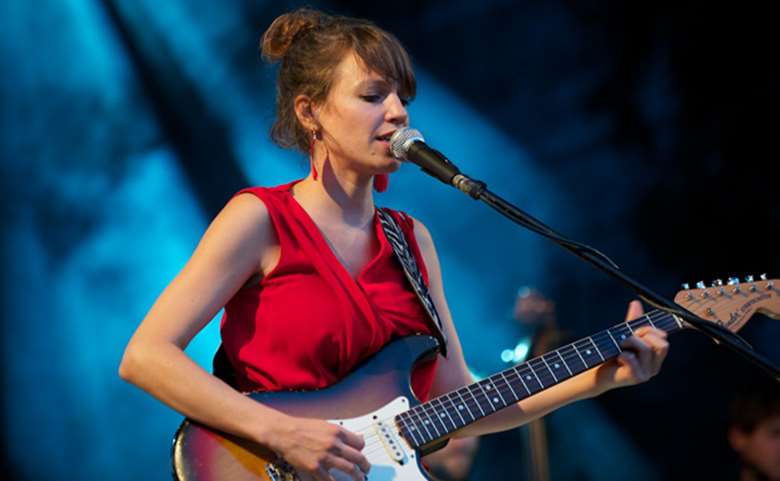Salzburg swings with Jazz and the City festival
Tuesday, November 4, 2014
In the city of Mozart and the von Trapp family (and you certainly can’t miss either anywhere you look) the surprise and delight of a jazz festival that ranks with the best in Europe is only surpassed by the fact that the gigs – dozens of them – are all free admission.

In most cities, in most countries, free entry would mean either badly paid musicians or dodgy local bands. But not in Salzburg – quite the reverse, as a string of unmissable names – Bjørnstadt, Pushnig, Frisell, Masekela, Surman, Scofield, Blanchard, Sheppard…. and on and on – play, wreathed in smiles and embraced by the enthusiasm of audiences who, one suspects, may not even realise just how utterly lucky they are.
Fifteen years ago, an enlightened city centre manager in this historic tourist-centred city (er, hello Cambridge, Bath, York, Oxford, Durham….?) grabbed ace festival director (and ex-Saalfelden boss) Gerhard Eder and initiated an event across a range of large and smaller venues in the heart of the old town that quickly grew into one of the autumn’s busiest attractions. Funded half-each by local government and business sponsors, Jazz and the City fills the gap at the end of a previous ‘down’ month for tourism with exactly one hundred gigs (and many of them double bills) over the five days Wednesday to Sunday. Take a taxi driver’s word for it (always the economic and cultural litmus test) – the place is fairly brimming over with people and activity in this otherwise quiet time of year.
And so to the music – or at least a taste of it in two days, since no-one, however enthusisatic, can get to every gig because there are so many. If reading the title ‘Big Band’ (say it in a phoney Austrian accent?) in the programme struck a note of apprehension, guitarist/vocalist/composer/leader Monika Roscher (above) defused it immediately with some wild guitar and far-reaching original compositions. In an Austrian premiere for this German project Roscher brought fresh thinking and uplift to big ensemble arrangements.
French clarinet maestro Louis Sclavis proved once again with his new Silk Quartet his unerring Ellington-like ability to bring phenomenally talented sidemen to the fore and foster their very best performances. His percussionist Keyvan Chemirani, for example, played hand drums that out-shone anything a full kit drummer might have done with Sclavis’ fluent, rhythmic, melodic twists and turns. Next evening, in duo with his co-maestro Michel Portal, Sclavis provided percussion and bass lines himself on bass clarinet along with soaring flights of improvisation in tandem with Portal in not just one but two genial, playful, intimate concerts.
England’s Sons of Kemet drove a capacity crowd of teenagers to grandmas to racous enthusiasm. Playful in their own inexorable, high energy way – and grinning ear to ear as groove after groove gave way to further excitement – Kemet fully deserved the crowd’s stomping calls for encore.
In the same large venue, Republic, Avishai Cohen’s trio played with delicacy and sophistication – sounding perhaps more Johann Sebastian than Wolfgang Amadeus. In the ridiculously baroque gilded rooms of the Mirabellschloss, the aptly named female voice/fiddle duo Kitsch and Glory played electronic loop-the-loop to underline at least one half of their name; whilst back in Republic loop veteran Nils Petter Molvaer’s band took many by surprise with Geir Sundstel doubling pedal steel with harmonica and (how times have changed!) banjo.
In a programme full of Gerhard Eder’s inspired musical choices, two newcomers stood out as particular revelations. In a relaxed, informal lunchtime set, the four-fifths-female and very young chuffDRONE (Austrian, no clue about the name though) soared and smiled and improvised with absolute confidence and empathy though their own fresh, open, not in the least conventional compositions – a band to watch if ever there was one. And the final smiling genial presence late on Saturday evening was 78rpm DJ Blue Flamingo – a brilliant curator and collector of shellac who not only knows how to grab audiences young and old with a masterly choice of pre-1960s dance music (jazz to world to early rock n roll) but surely also surely the only DJ in the world to carry an original pressing of the first ever jazz record, the 1917 Livery Stable Blues by the ODJB.
Salzburg – your hills (and tills) are certainly alive with the Sound of Jazz.
– Robert Beard